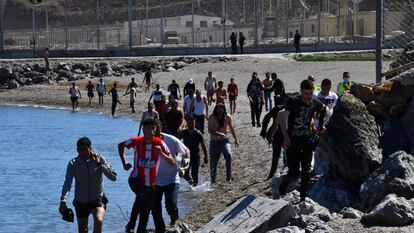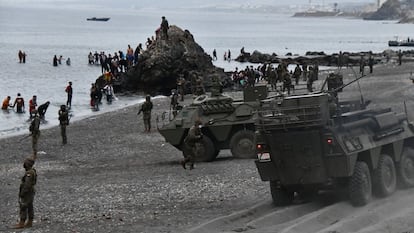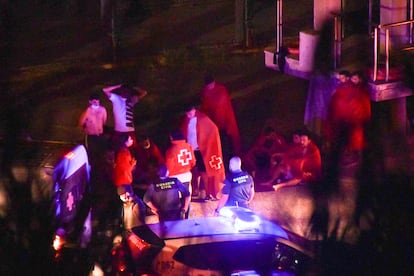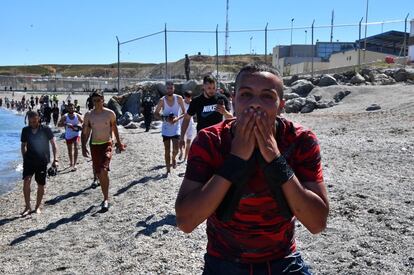Spain deploys army after some 6,000 undocumented migrants swim to Ceuta amid diplomatic row with Morocco
Several military units have been sent to control the situation in the North African exclave city. Prime Minister Pedro Sánchez has said his “priority is restoring normality”

Some 6,000 undocumented migrants arrived illegally in the Spanish exclave city of Ceuta in North Africa on Monday and Tuesday, according to the central government’s delegate in the city. Government sources told Spanish news agency Efe that around 1,500 of the migrants may be minors, although their age still needs to be confirmed. Most of the arrivals were recorded between 4.30pm and 7pm yesterday.
The migrants reached Ceuta by swimming from the neighboring city of Fnideq, which is on the border of the breakwater that demarks the exclave city from Morocco. Other migrants used rudimentary swimming boards to make it to from the Moroccan city, also known as Castillejos, and which is home to around 7,000 people. The migrants entered via Tarajal beach and the area of Benzú. One person died in the crossing, according to the Cadena SER radio station and confirmed by this newspaper. Moroccan authorities made no effort to stop the wave of arrivals and the Moroccan government remained silent on the issue on Monday.
In response to the situation, Spanish Prime Minister Pedro Sánchez said via Twitter that Spain “will defend the integrity” of Ceuta “against any challenge. My priority right now is restoring normality in Ceuta. Its citizens must know that they have the absolute support of the Spanish government and our utmost resolve to protect their security,” he wrote.

In the early hours of Tuesday morning, several army units were sent to Ceuta to control the situation on the ground. The goal is to group the new arrivals together and help maintain the calm in the areas of the city where migrants have gathered. The Civil Guard has also strengthened its presence at the border, breakwater and border perimeter. Members of the army’s logistics unit have also been sent to Ceuta to set up beds for the new arrivals.
Adult migrants found on the street will be taken to Benoliel stadium and later deported, according to the central government’s delegation in Ceuta. Underage migrants will for now remain at a camp for minors and at warehouses in Tarajal. According to sources from the Red Cross charity, the facility in Tarajal only has capacity for around 200 people and is completely overwhelmed.
The Spanish Interior Ministry is hoping to negotiate the deportation of the adult migrants who arrived on Monday. Interior Minister Fernando Grande-Marlaska told state broadcaster TVE that nearly 1,500 people had been deported by midnight on Monday. The ministry has also sent 150 National Police officers to Ceuta to help with the process. With respect to the migrant teens, who are not subject to the same deportation agreements, Grande-Marlaska said: “In accordance with the law and international treaties, we will protect the minors.”

The arrival of 6,000 undocumented migrants in just one day is unprecedented in Spain. According to sources who spoke to EL PAÍS, not even in the worst moments of the country’s immigration crisis have so many migrants arrived in just 24 hours. In the Canary Islands, at the peak of the crisis, 2,000 migrants reached the archipelago between November 7 and 8. In 2018, the year that Spain recorded the highest number of irregular arrivals, nearly 2,800 people landed by boat between June 21 and 27. Government sources believe the arrivals are just the beginning of a mass wave of immigration from Morocco, not only of Moroccans but also of sub-Saharan Africans.
In addition, 86 migrants have also jumped the border fence between Morocco and Spain’s other North African exclave city, Melilla. According to the government delegation in Melilla, more than 300 people tried to make the crossing but were stopped by Civil Guard and National Police officers.
Tensions with Morocco
The situation in Ceuta comes after weeks of rising tensions between Morocco and Spain. The diplomatic row began in April when Moroccan intelligence services found out that Brahim Gali, the 73-year-old founder of the Popular Front for the Liberation of Saguia el-Hamra and Río de Oro (Polisario Front), had been admitted under a false name to a hospital in the Spanish city of Logroño when he was suffering from Covid-19. The Polisario Front is a liberation movement by the Sahrawi people and is outlawed in the parts of Western Sahara under Moroccan control. Interior Minister Grande-Marlaska defended the move, requested by Algeria, “for strictly humanitarian reasons.” The Moroccan Foreign Affairs Ministry, however, lambasted the decision, calling it an affront to the spirit of “association and good neighborliness,” and threatened Spain with reprisal.

A resident of Fnideq told EL PAÍS that Moroccan authorities made no attempt to stop the migrants from entering Ceuta, while Spanish sources agreed that they were “unusually passive.” Several videos of people swimming without being stopped were shared on social media. “The Moroccan police are letting the migrants near the closest beaches of Ceuta. From there, they arrive at once,” said one source from the exclave city. The lack of security at the Moroccan beaches contrasts with the rigorous police checkpoints at the country’s municipalities, including Fnideq.
Despite this, both Grande-Marlaska and Foreign Affairs Minister Arancha González Laya denied that mass arrival of undocumented migrants was related to the spat. On Monday, González Laya told the Cadena SER radio network that Moroccan authorities told her the situation was “not due to the disagreement” over Gali’s hospitalization in Spain. While Grande-Marlaska told state broadcaster TVE: “We have an absolutely fruitful relationship with the Moroccan government on the issue of migration [...]. This is an exceptional situation.”
Border closures
A steady flow of undocumented migrants has been reaching Ceuta and Melilla, since Moroccan authorities closed its border in March 2020. The move was aimed at controlling the spread of the pandemic but has led to serious problems for the country’s more than 35,000 cross-border workers. Domestic workers, qualified professionals and employees in the service sector who were left on the other side of the border lost their jobs. The border closure also put an end to the illicit trade of goods, which employed thousands of people, many of whom traveled from inland cities such as Fez.
English version by Melissa Kitson.
Tu suscripción se está usando en otro dispositivo
¿Quieres añadir otro usuario a tu suscripción?
Si continúas leyendo en este dispositivo, no se podrá leer en el otro.
FlechaTu suscripción se está usando en otro dispositivo y solo puedes acceder a EL PAÍS desde un dispositivo a la vez.
Si quieres compartir tu cuenta, cambia tu suscripción a la modalidad Premium, así podrás añadir otro usuario. Cada uno accederá con su propia cuenta de email, lo que os permitirá personalizar vuestra experiencia en EL PAÍS.
¿Tienes una suscripción de empresa? Accede aquí para contratar más cuentas.
En el caso de no saber quién está usando tu cuenta, te recomendamos cambiar tu contraseña aquí.
Si decides continuar compartiendo tu cuenta, este mensaje se mostrará en tu dispositivo y en el de la otra persona que está usando tu cuenta de forma indefinida, afectando a tu experiencia de lectura. Puedes consultar aquí los términos y condiciones de la suscripción digital.








































